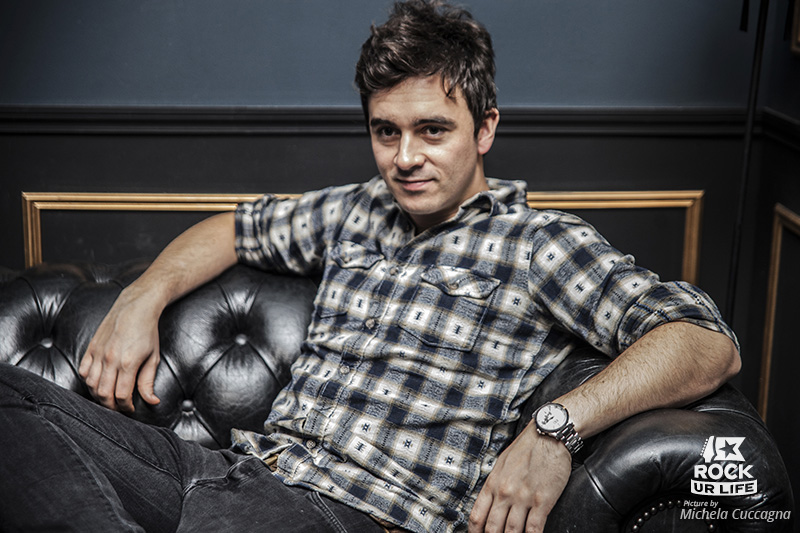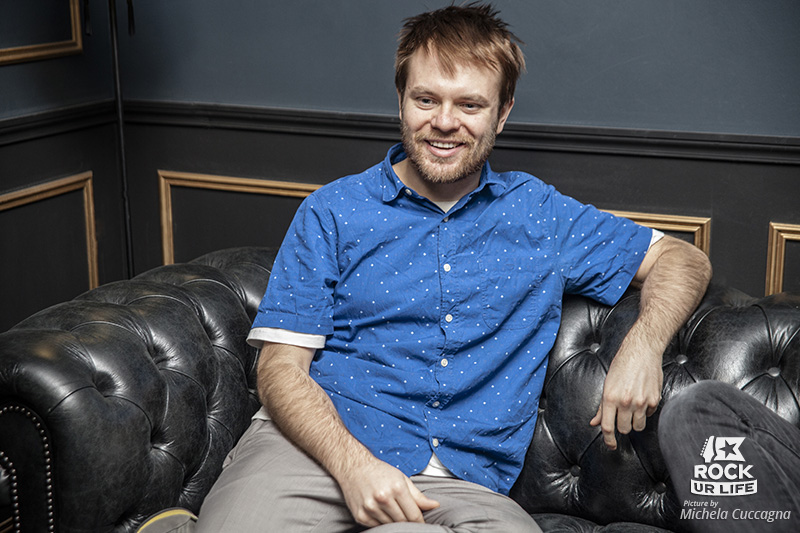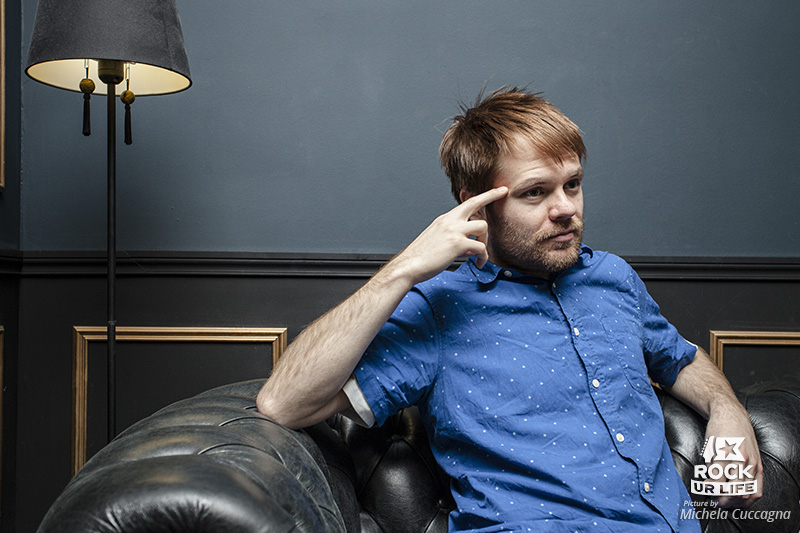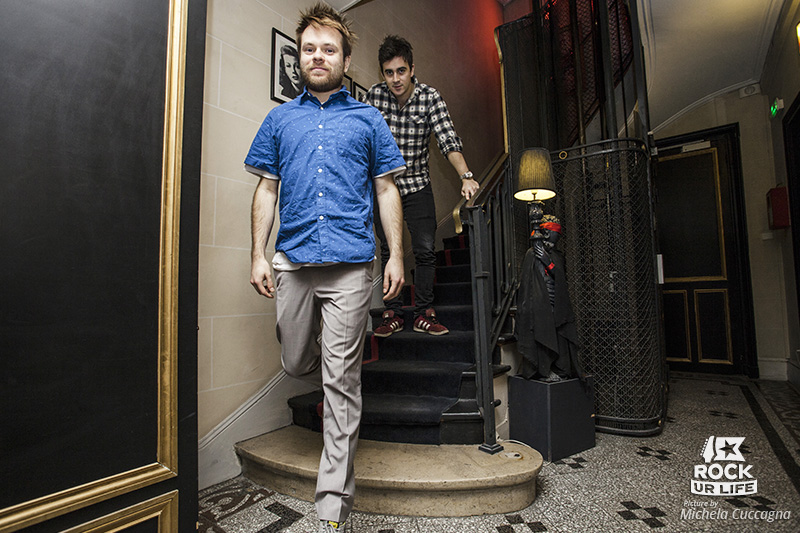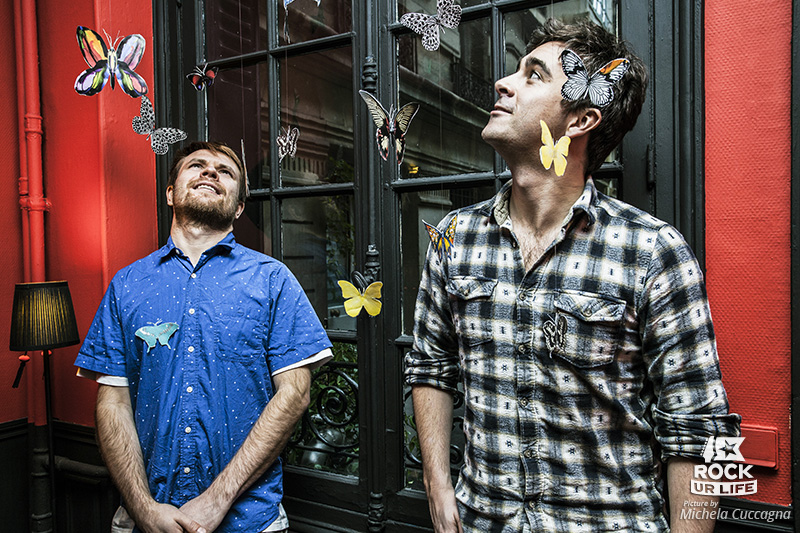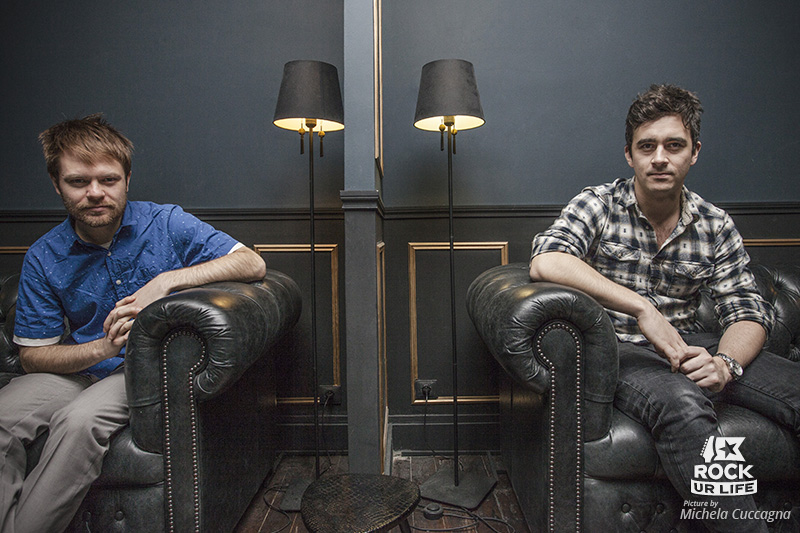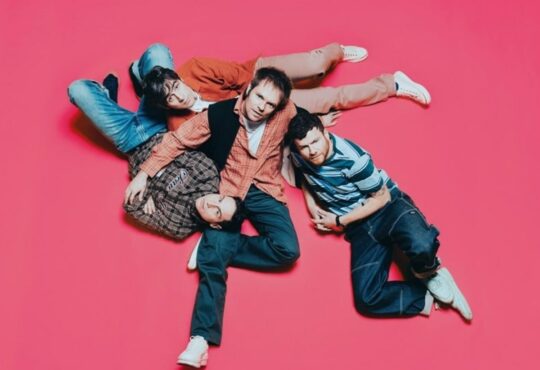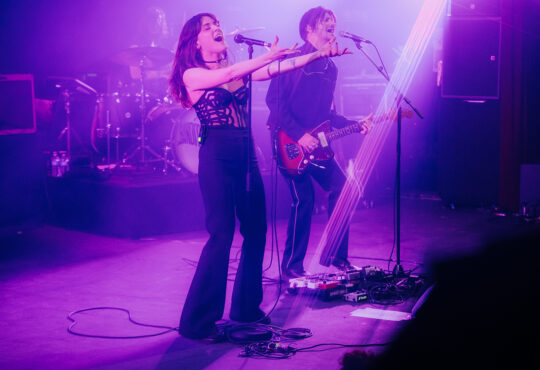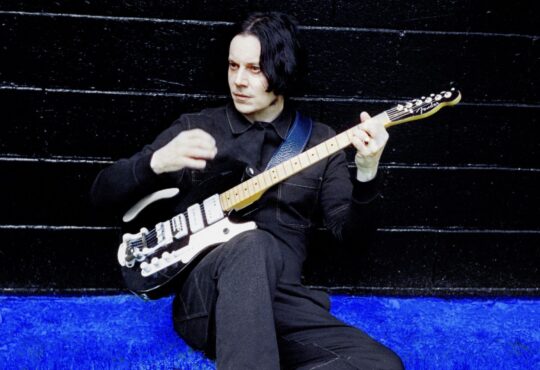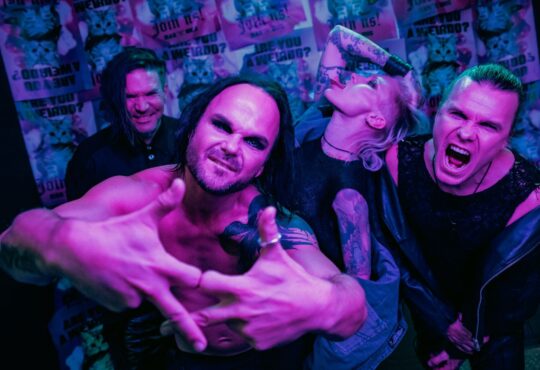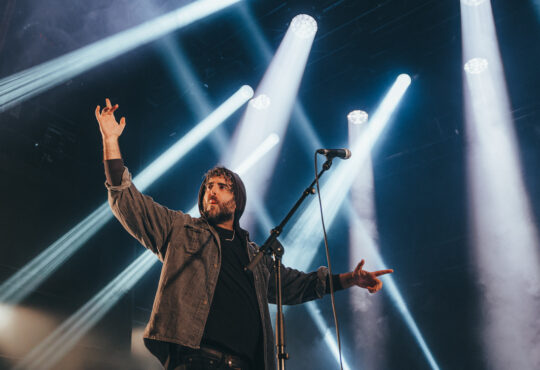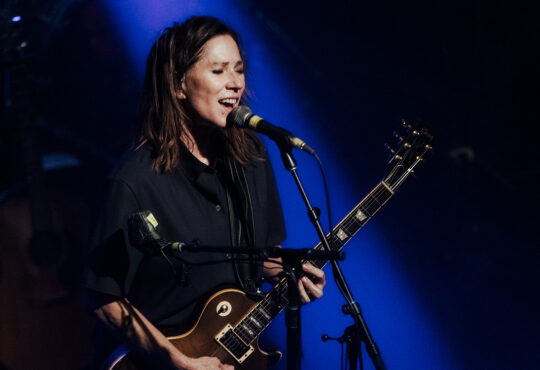Ahead of the release of new album “The Mindsweep”, RockUrLife got the chance to chat with Rou Reynolds and Chris Batten, singer and bass player of the four piece band Enter Shikari, a few weeks before the show at La Cigale.
First how are you?
Rou Reynolds (vocals): Very well, thank you.
You look tired.
R: Damn, I thought I was hiding it. (laughs) Yes, a little bit. We woke up at 6 to get the Eurostar.
Chris Batten (bass): This is actually us looking quite fresh.
R: (laughs) Chris had 6 hours of sleep, it’s pretty good for us.
C: This might be why I’m really tired.
Enter Shikari is back with a new album called “The Mindsweep“. What’s the story behind this title? Is it a reference to the game of the (almost) same name?
R: “The Minesweeper”? It’s not really a reference to the game, but that’s a pun of word. “The Mindsweep” is almost a progression from Georges Orwell’s book “1984”. Anytime that there’s a new idea or a new system that’s outside the perceived norms and the way that things are, those in power often do whatever they can to get rid of that idea. They just ignore it and don’t give it any promotion, or do whatever they can to stop this idea from taking flight.
The artwork was created by Luke Insect. How did you end up working with him?
R: Just suggested, I think?
C: He was up for doing it. It’s always good to have a fresh take on our artworks, because we’re really involved in the music, so it’s nice to have someone who comes in, listens to the album with a fresh view or perception, and documents it in a drawn or visual form. We’ve just always really liked the idea of having brains with the synopsis moving around.
In this album, each song sounds very different and has its own identity, yet they’re all really elaborated. There’s even more diversity than in “A Flash Flood Of Colour” (2012), which is very confusing because you’re walking the fine line between different styles, and we still can’t label you.
R: (laughs) Sorry!
It seems like one of your main goals is to innovate, to surprise and to not fall into the trap of becoming a cliché of yourself as a band.
R: Yeah. That’s a good way of putting it. Avoiding cliché is becoming hard nowadays. When “Take To The Skies” (2007) came out, everyone was like “Oh guys, it’s so innovating!”. But now, it’s almost cliché to have a breakdown with a simple line over the top. You have to keep moving. It feels like we just got the cliché-man at the top of our shoulders with a whip, just keeping us on the run. (laughs). And we thank him for it!
Which are your three favourite songs of this record, and why?
C: It’s hard.
R: MEAN question.
C: The most positive thing for me in this album is the big anthemic choruses that the songs always have. Also, the way we’ve hopefully managed to make the songs complement each other with all kind of different instrumentations. With that in mind, the real big choruses are in “Torn Apart”, “The One True Colour”, and “There’s A Price On Your Head” as well, even though this one is a very different sounding song.
R: I could literally just agree, but I’d just say another thing about “The One True Colour” and “Torn Apart. The outros are big escalating intensifying outros, which is something we’ve done in the past, but I think, hopefully, we’ve really nailed it on this album. I’m just making sure the track’s climax is just when you wanted to, not too early or too late. It’s quite difficult.
C: We plant the seed with melodies, and there’s a few times throughout the album where subliminally it reappears later on in the song, then it becomes a very big melody. It happens in “Dear Future Historians…”.
R: A tactic of classical music. Which is quite a big influence on this album. But also I would go with “Never Let Go Of The Microscope”, just because of the nature of the lyrics, the venom, the real passion that that song has in it.
There are a few philosophical references in this album. When did you really get into philosophy?
R: Well, I guess I got into it as many, probably, other people do, through Bertrand Russell. He’s very good at introducing people to philosophy and he’s got various historical books where he takes you through the very stages of philosophy and the philosophers throughout ancient Greece like Confucius, all the way out to the modern times. I first found out about him through what he wrote about religion and atheism. Bertrand Russell is just mindblowing in that area. We got to go to Athens this year, which was like a dream come true. Walking the same streets as Socrates was amazing. And obviously a lot of ancient philosophy is a big influence on the album as well.
Is there a song you think you couldn’t have been able to write and compose a few years ago?
Rou & Chris: All of them!
R: Because we REALLY push ourselves everytime we make an album, we write up to the forefront of what we know. We want to make sure we’re doing something new and not only something we could have done a few years ago. Lyrically as well, I couldn’t have written all of this.
C: If you’re constantly writing and you feel comfortable, you know where it should go. When you push yourself out of your comfort zone, there’s no right way to go, so it opens up so many doors. In fact, there’s no settled way it should go in your mind, so you’re free to do new. It’s a bit of a cryptic answer. (laughs)
R: Obviously, our music is a space to be comfortable as well. But pop music is comfortable music. Folk music is comfortable music. I think the essence of punk -and I mean the punk state of mind, not mohawks and spitting on people- is that this discomfort is making people think. If people listen to the music straight away and think “Oh… mmh… it’s nice, isn’t it?”, that’s obviously not what we’re going for.
With the success of shitty pop songs, what do you think is the importance of lyrics nowadays?
C: It’s important for us. We tour around the world playing this music, putting across this message in it. We wouldn’t be putting so much effort, time and intensity into it if it wasn’t something we really believed in. So, on a selfish sense, it’s very important for us.
R: I think we’d have a very different performing style if the lyrics weren’t what they are. Even if we were just singing about personal things like relationships or personal struggles, not everyone can relate to that, whereas we can all relate to the social, humanistic and environmental features. Some people don’t want to relate or don’t think they can relate, but of course we only have one Earth, one chance at survival. Everyone can relate, hopefully.
What strike you the most about the system we’re living in?
R: What strikes us the most? Okay. How long have you got? (laughs). Most of the world’s problems are caused by capitalism, the fact that we put profit over anything else. There’s nothing built in capitalism that respects the environment or produces equality. I can’t see anything else more important than our world and a healthy, equal, enjoyable and flourishing society.
C: The fact that it benefits so few people is a huge thing.
R: Everything seems to have a link at least, if not a completely caused-by.
Talking about the system and politics, we have in France what we call the Front National, or “National Front”, which is an economically protectionist, socially conservative, and nationalist political party that has been around for a long time but is now getting more and more powerful thanks to the growing number of supporters. If you were living in France, what would you do?
C: We have similar things in England.
R: I think every country seems to have a revival of that. As soon as there’s an economic downtown and things get hard, people want to direct their anger on something on someone. It’s very easy to do that. It’s like: “Let’s blame immigrants!” without, again, looking at the actual core of the problem. Also the fact that technology is taking over, which means getting rid of all the jobs. It’s very simple to blame a human. If you put a face to it, then it becomes a lot easier.
C: People are angry but don’t quite understand why or where to direct their anger, and the result is that it’s very easy to jump on board.
R: It is necessary to concentrate on one’s emotions. The key thing is always education, and encouraging a community to be open to another one. But yes, we have exactly the same thing in Britain indeed.
But is it that powerful out there?
C: It’s winning more seats. The majority of people are very openly against it.
R: We actually have the National Front, and they’re linked to the BNP (British National Parties), which must be exactly the same as that one. And then, we have a lighter version which is the UK Independence Party. They’ve just got a seat in the European Parliament, and they’re starting to get bigger and bigger. Because we have elections coming next year, a lot of people are saying that they have a good chance of becoming a main contending party because normally we have the left which is labor, and the right, which is conservative. They say the UK could be uplifted with them, which is dangerous because they’re more conservative than the conservatives. It seems to be the way things are going, and it’s more and more important to battle against it.
As you state in “System/Meltdown”, “Countries are just lines drawn in the sand”. Recently, David Cameron spoke about his project of setting new restrictions on immigration. What is your opinion about that?
R: “System/Meltdown” was talking on a philosophical basis. This concept of countries is an outdated way of structuring the world. It’s not doing any good at anyone. I think it’s also distracting from the reality that we live on one planet that has final resources and we don’t have any other chance of survival and of making it work. If you divide that into countries, they start fighting for their little portion rather than thinking about how they can make it work for everyone. Anything to do with countries makes me cringe. It’s just a cliché, an outdated way of living. Even though I presume Paris is, nowhere is that more obvious than in London, where there’s people from all over the world living there, wherever you go. There’s a lot of people talking about “the british identity” and its fish and chips and beers. They think they’re losing their “identity”. Why would you want to limit your identity to just one very small thing? Why don’t you want your identity to be all of these different types of things? It just makes no sense to me. All our NHS, our health service that we have, is pretty much run by people that have moved to the country. They have jobs in the NHS, so we don’t have diseases. (laughs)
C: It benefits the country a lot more than it’s told.
On a lighter note now: Rou, among many other interesting things, you said in your Z-Day speech on Music’s Social Value that “the musical instrument is an instrument of unity”. Is this why you chose to become musicians?
R: I think it was more personal at first, just for the fund of it.
C: I assume people pick up an instrument because they want to make it sound good. We were very young when we first started, 10 or 11 years old. Back then, it was just fun. Since then, it’s tending to something different.
R: Once we realized the power and the pedestal that we were given, being in a band that was able to tour a lot somewhere in the public eye, it just made us want to use our small time fame to speak about issues that we didn’t think would be spoken about. Music is one of the best ways to encourage unity because straight away, you’re putting lots of people who don’t know each other into a room, or into a field on a festival, so it’s already uniting people from all different backgrounds. It’s a great basis for talking about unity.
To conclude, same traditional question that we asked you last year. We are “RockUrLife”, so what rock your lives this year?
R: What did I say last time, do you remember?
You said your cat.
Rou & Chris: (laughs)
R: Yeah, I was going to say that!
And Rory said you rocked his life.
C: Is that what he said? Oh, thanks bud! He’s still rocking my life too.
R: These really wide questions are the hardest because it’s like “Do I talk about food or music?”.
C: For some reason I can’t get eggs out of my mind.
R: (laughs)
C: I really enjoyed eggs this year. I didn’t use to eat so many eggs, but I really started to enjoy it.
R: What is your favourite?
C: Must be hard-boiled. Always nice in a sandwich. Yeah. Hard-boiled eggs, rocking my world!
We were talking about politics, now we’re talking about eggs. Nice!
C: Get on with us!
R: I’m not sure I’m going to talk eggs… I’ve been really lurking fresh air, so I would go for fresh air.
C: You really had fresh air at Christmas time as well.
R: Yeah, Christmas is always refreshing. Does that work?
I think so!
R: Ok, cool. (laughs)
Well, we’re done. Thank you again for your time!
R: Thank you too!
C: Thanks, it was nice to see you.
Website: entershikari.com




